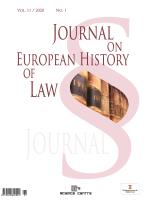Legal Status of Women in Codes Binding in Central Polish Lands in the Early Nineteenth Century
Legal Status of Women in Codes Binding in Central Polish Lands in the Early Nineteenth Century
Author(s): Piotr Zbigniew PomianowskiSubject(s): History, Law, Constitution, Jurisprudence
Published by: STS Science Centre Ltd
Keywords: legal status of women; Napoleonic Code; Landrecht of 1794; ABGB; Poland.
Summary/Abstract: The article describes the position of women pursuant to the codes adopted in the territories of contemporary Poland at the beginning of the nineteenth century (Allgemeines Landrecht für die Königlich Preussischen Staaten, Code civil des Français, Allgemeines Bürgerliches Gesetzbuch). According to all three codes wives were subordinate to their husbands, but there were many differences in specific matters. The husband usually administered common marriage property, or in case of separate property regime, he had a significant influence on his wife’s property. In all the analysed codes, parental authority was exercised mainly by the father, although children had to obey their mother, too. The relations between the spouses could be fundamentally changed by prenuptial agreements. Moreover, the legal practice changed the letter of law many times and in numerous cases it differed between the territories where the same code was in force (e.g. France and the Congress Kingdom of Poland – in both countries the Napoleonic Code was in force). Thus, time-consuming research on sources like notarial deed, as well as court records should precede a complex analysis covering the application practice of all three codes on the Polish lands.
Journal: Journal on European History of Law
- Issue Year: 11/2020
- Issue No: 1
- Page Range: 96-101
- Page Count: 6
- Language: English
- Content File-PDF

